
Daihatsu will make some improvements to the new Hijet Cargo and release it on November 5, 2024. This improvement will include strengthening safety equipment to comply with the latest regulations, and the price will also be revised. In this article, we will take a detailed look at the appeal, design, performance, price, and other aspects of the new Hijet Cargo.
About the new Hijet Cargo partially improved 2024 model
In this improvement of the Hijet Cargo, in order to comply with the latest regulations , two rear sonars have been added to the corner sensors (two in the front and four in the rear). In addition, the price will be revised further.
New Hijet Cargo Partial Improvement 2024 Model Price Revision
Manufacturer’s suggested retail prices will be revised taking into account rising raw material prices, etc.
Hijet Cargo Price 2023 Price
| grade | engine | transmission |
Drive system |
Current Price | New Price |
|---|---|---|---|---|---|
| Special | Inline 3-cylinder DOHC 0.66L |
5MT | 2WD | 1,045,000 yen | 1,100,000 yen |
| 4WD | 1,199,000 yen | 1,254,000 yen | |||
| CVT | 2WD | 1,100,000 yen | 1,155,000 yen | ||
| 4WD | 1,254,000 yen | 1,309,000 yen | |||
| Special Clean | CVT | 2WD | 1,122,000 yen | 1,177,000 yen | |
| 4WD | 1,276,000 yen | 1,331,000 yen | |||
| Deluxe | 5MT | 2WD | 1,155,000 yen | 1,215,500 yen | |
| 4WD | 1,309,000 yen | 1,369,500 yen | |||
| CVT | 2WD | 1,210,000 yen | 1,270,500 yen | ||
| 4WD | 1,364,000 yen | 1,424,500 yen | |||
| cruise | 5MT | 2WD | 1,232,000 yen | 1,298,000 yen | |
| 4WD | 1,386,000 yen | 1,452,000 yen | |||
| CVT | 2WD | 1,331,000 yen | 1,397,000 yen | ||
| 4WD | 1,485,000 yen | 1,551,000 yen | |||
| Cruise Turbo | Inline 3-cylinder DOHC 0.66L turbo |
CVT | 2WD | 1,452,000 yen | 1,529,000 yen |
| 4WD | 1,606,000 yen | 1,683,000 yen |
New Hijet Cargo partially improved 2024 model specs
| Specifications | New Hijet Cargo | New Hijet Cargo |
|---|---|---|
| Engine type | NA | turbo |
| full length | 3,395mm | 3,395mm |
| Overall width | 1,475mm | 1,475mm |
| Height | 1,890mm | 1,890mm |
| Wheelbase | 2,450mm | 2,450mm |
| engine | 660cc inline 3 DOHC engine |
660cc inline 3 DOHC turbo engine |
| Maximum power | 39kW (53hp) / 7,200rpm |
47kW (64hp) / 5,700rpm |
| Maximum torque | 60Nm (6.1kgm) / 4,000rpm |
91Nm (9.3kgm) / 2,800rpm |
| transmission | CVT | CVT |
| Drive system | FF/4WD | FF/4WD |
| JC08 mode fuel economy | 20.5km/L (2WD) 20.3km/L (4WD) |
19.7km/L (2WD) 19.0km/L (4WD) |
| WLTC mode fuel economy | 15.6km/L (2WD) 15.6km/L (4WD) |
14.7km/L (2WD) 14.7km/L (4WD) |
About the new Hijet Cargo full model change
The exterior design has been changed, evolving into a square silhouette.
The new platform, DNGA (Daihatsu New Global Architecture) , has been adopted. The vehicle structure has been redesigned to reduce vehicle weight, improve vertical bending rigidity by 30% compared to the previous model , and increase the high tensile strength rate of the upper body by 10%, resulting in a reduction in the overall vehicle weight .
The transmission has been improved to become the ” Newly developed CVT exclusively for FR vehicles ” and the engine has been improved. By adopting Japan’s first “multiple spark (multiple ignition)” and other features, the engine has improved combustion efficiency by improving the compression ratio and atomizing the injector spray.
The interior features a 9-inch display audio . SmartDeviceLink and Apple CarPlay-compatible apps can be operated on the display.
Equipped with advanced technology “Next Generation Smart Assist . “
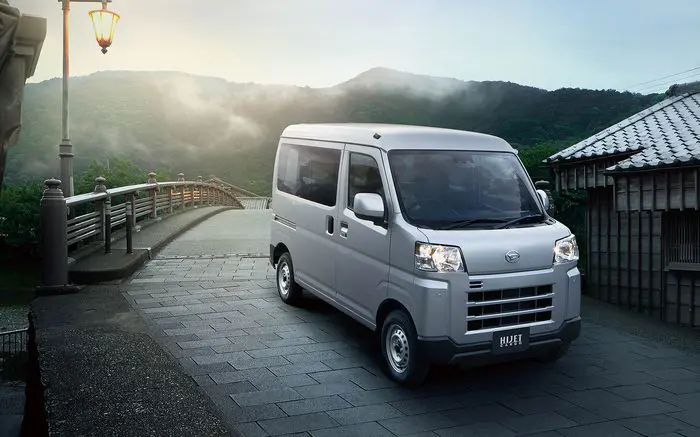
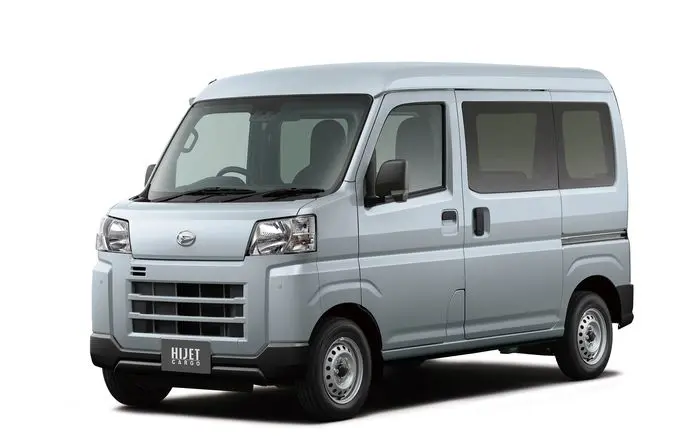
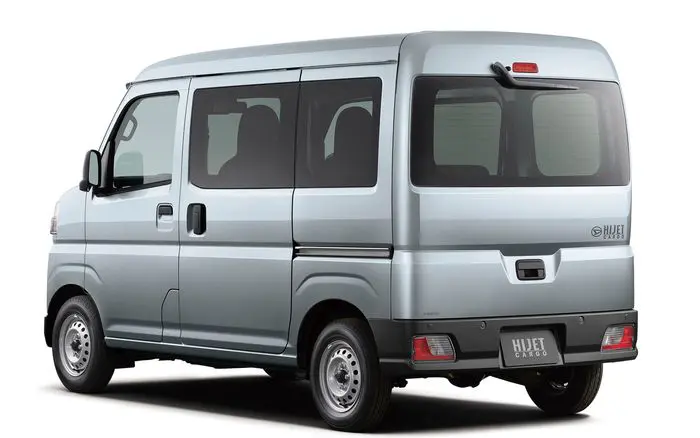
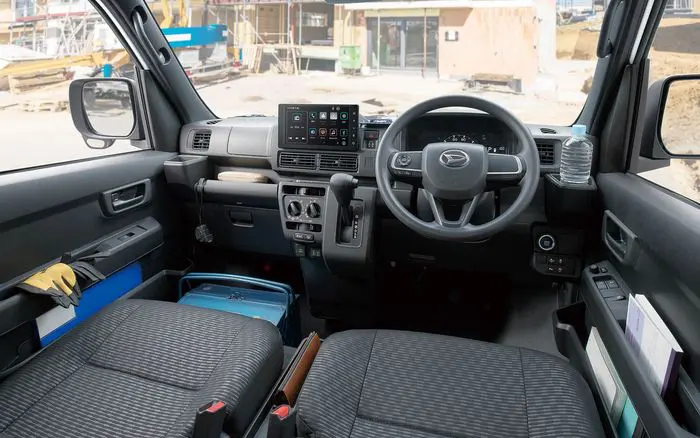
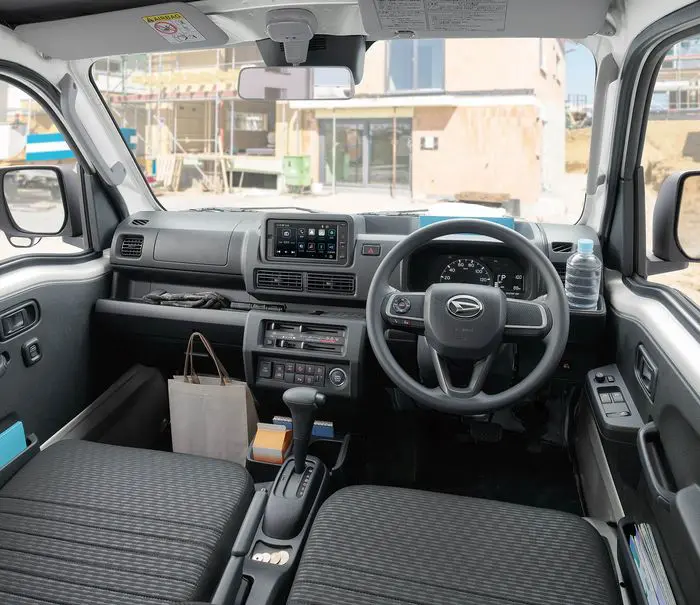
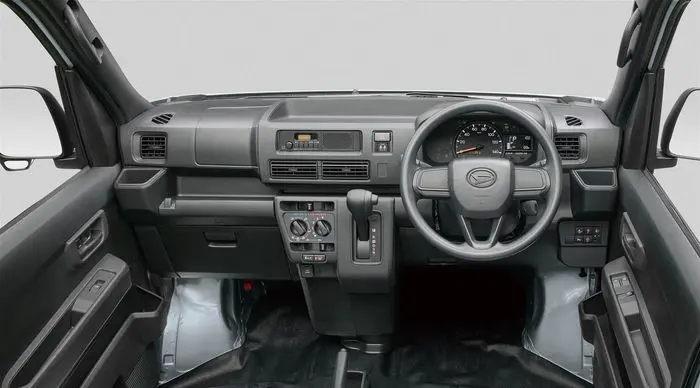
New Hijet Cargo equipped with advanced technology “Next Generation Smart Assist” as standard
Equipped with “Next Generation Smart Assist”. Adopts a stereo camera, supports pedestrians, and has a wider operating speed range than before. “Safety Support Car S (Wide)” (Sapo Car S (Wide) eligible vehicle.
Equipped with two corner sensors on the front and rear of the vehicle , the further evolved “Next Generation Smart Assist” helps avoid accidents in close calls while driving and supports your safe driving. In addition to sonar sensors, the car is newly equipped with the world’s smallest stereo camera that does not obstruct the driver’s field of vision or headroom. It accurately captures various information such as pedestrians, preceding vehicles, and obstacles, and warns the driver or activates emergency braking.
Collision warning function / Collision avoidance support brake function ① Collision warning (for vehicles, for pedestrians) When the camera detects a vehicle or pedestrian in front while driving and judges that there is a risk of collision, it will notify you with a buzzer sound and a display in the meter.
② Primary brake (for vehicles, for pedestrians) If the system judges that there is a risk of collision, it will automatically apply a weak brake (primary brake) to encourage the driver to avoid the collision.
③ Damage reduction brake assist (for vehicles, for pedestrians) If the driver applies the brake when the primary brake function is activated, the brake assist will be activated and the braking force will be increased.
④ Emergency brake (for vehicles, for pedestrians) If the system judges that a collision is unavoidable, it will slow down with a strong brake (secondary brake). It avoids a collision or reduces damage.
Lane Departure Prevention Control Function If the vehicle is about to deviate from its lane without using its turn signal, the system warns the driver with a buzzer and a display on the meter, urging the driver to take action. It also assists the driver in steering to bring the vehicle back into the lane.
If the driver does not notice that the vehicle ahead has started moving when the preceding vehicle departure notification function is disabled and does not start moving, a buzzer will sound and the display on the meter will notify the driver.
AT false start prevention control function + false start prevention function with brake control ① Forward false start prevention control function When the stereo camera detects an obstacle such as a vehicle or wall within 4m ahead, if the accelerator pedal is pressed with the shift position in “forward”, the engine output is limited to prevent sudden start. ② Rear false start prevention control function When the sonar sensor built into the rear bumper detects an obstacle such as a wall within 2-3m behind, if the accelerator pedal is pressed with the shift position in “reverse”, the engine output is limited to prevent sudden start. Brake control has also been added.
The high beam assist stereo camera detects the brightness of oncoming headlights and automatically switches between high and low beams. This allows you to drive with high beams without having to switch between them, making nighttime driving safer even on roads with few street lights.
Adaptive Driving Beam: When driving with high beams on, if an oncoming vehicle is detected, the light in the area of the high beams that faces the oncoming vehicle will automatically be blocked.
Sign Recognition Function If the stereo camera detects a no entry sign, a notification will be displayed in the meter.
Differences between “Smart Assist II”, “Smart Assist III” and “Next Generation Smart Assist”
| Functional Systems | Smart Assist II |
Smart Assist III |
Next-generation Smart Assist |
|---|---|---|---|
| method | Laser radar + monocular camera |
Stereo Camera | Stereo Camera |
| Automatic Brake Pedestrian |
– Warning only (below 50km/h) |
◯ |
◯ (50km/h or less) |
| Automatic braking collision avoidance |
◯ |
◯ |
◯ (30km/h or less) |
| Automatic brake damage reduction |
◯ |
◯ |
◯ (80km/h or less, 50km/h or less for pedestrians) |
| False start prevention front/rear |
◯ | ◯ | ◯ (Brake control) |
| Lane Departure Warning | ◯ | ◯ | ◯ |
Announcement of the start of the first mover |
◯ | ◯ | ◯ |
| Auto high beam or adaptive high beam system |
– | ◯ | ◯ |
| Sign Recognition | – | – | ◯ |
| Corner Sensor | – | – | ◯ |
Daihatsu